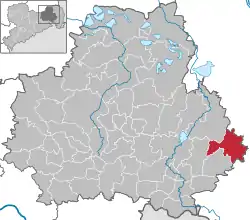Weißenberg
Weißenberg (Upper Sorbian: Wóspork) is a town in the district of Bautzen, in the Free State of Saxony, Germany. It is located 11 km north of Löbau, and 16 km east of Bautzen.
Weißenberg/Wóspork | |
|---|---|
.png.webp) Coat of arms | |
Location of Weißenberg/Wóspork within Bautzen district  | |
 Weißenberg/Wóspork  Weißenberg/Wóspork | |
| Coordinates: 51°11′49″N 14°39′34″E | |
| Country | Germany |
| State | Saxony |
| District | Bautzen |
| Subdivisions | 15 |
| Government | |
| • Mayor | Jürgen Arlt (non-party) |
| Area | |
| • Total | 50.92 km2 (19.66 sq mi) |
| Elevation | 197 m (646 ft) |
| Population (2019-12-31)[1] | |
| • Total | 3,096 |
| • Density | 61/km2 (160/sq mi) |
| Time zone | UTC+01:00 (CET) |
| • Summer (DST) | UTC+02:00 (CEST) |
| Postal codes | 02627 |
| Dialling codes | 035876 |
| Vehicle registration | BZ, BIW, HY, KM |
| Website | www.stadt-weissenberg.de |
Notable people
- Pawoł Nedo (1908–1984), educator and anthropologist Sorbian, Chairman of the Domowina
- Benno von Heynitz (1924–2010), resistance fighter and lawyer, founder of Bautzen Committee e. V. and the Bautzen Memorial
- Wolfgang Beyer, city historian and former director of the outpatient clinic
In fiction
In James P. Hogan's science fiction novel The Proteus Operation, Weißenberg was the location of a time machine in Nazi Germany.
References
- "Bevölkerung des Freistaates Sachsen nach Gemeinden am 31. Dezember 2019". Statistisches Landesamt des Freistaates Sachsen (in German). July 2020.
This article is issued from Wikipedia. The text is licensed under Creative Commons - Attribution - Sharealike. Additional terms may apply for the media files.